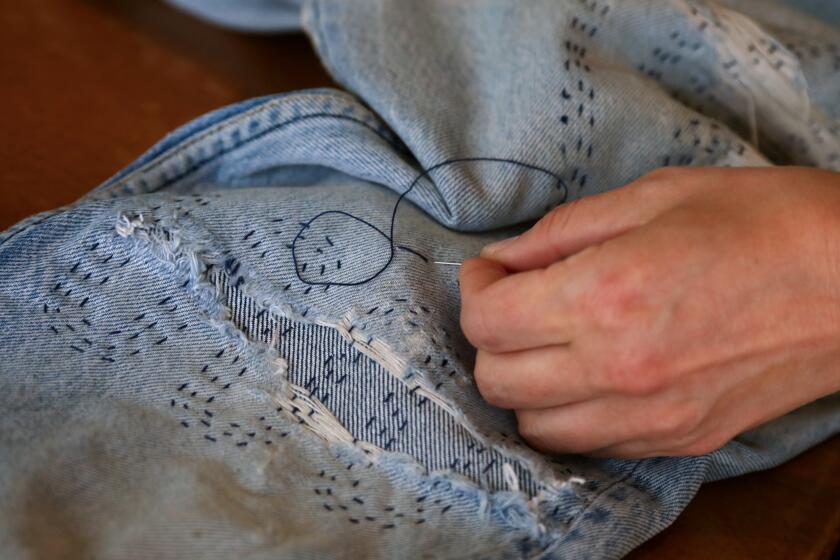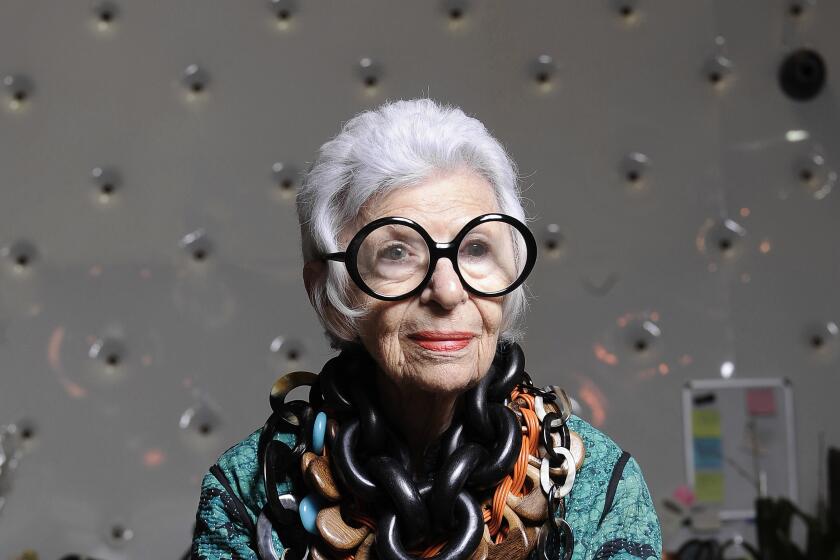From Strip Show to Skid Row
I’ve set a zero-tolerance policy for my family. Use it or lose it and no amnesty -- not for Barbie, not for GameBoy and definitely not for last season’s Steve Madden slides.
So on a recent run to my local Goodwill donation center, I readily added my own offerings to a small mound of green plastic garbage bags, old cartons and ragged furniture.
I barely registered the middle-aged man inventorying the donations. But while driving home, I wondered who would take a job handling other people’s leavings. Do household items come clean or crusty? Are clothes washed and folded? What if something nasty slithers out of a bag?
Goodwill intrigued me. In a city where competition for castoffs is hot, who donates to a charity that lacks a distinct constituency? I can guess who gives to Hadassah, Seoul Thrift or Out of the Closet. But where is Goodwill’s constituency? Among the good, the willing, or both?
There’s a high fusty factor to Goodwill’s public identity. Goodwill isn’t your charity. It’s your Aunt Beulah’s. Many stores are shabby, and the customers aren’t hunting for vintage chic. The whole scene seems part of an older era, a challenge met head-on by the venerable charity’s new tag line -- “It’s not what you think” -- and a spruced-up visual identity that owes more to TJ Maxx than the Salvation Army.
The current fervor for faith-based activities notwithstanding, Goodwill’s branding strategy doesn’t mention its Christian roots. But it’s certainly there: In the 1910s, several Methodists in Los Angeles began a social and religious outreach to the Mexican community around the Olvera Street plaza. Their efforts to raise money for a medical clinic led to the first Goodwill store in Southern California, following the model developed by a minister in Boston’s similarly depressed South End.
The local church folks bought 200 old coffee sacks and paid unemployed immigrant women to mend them. The “opportunity bags” were distributed to businessmen, students, church members and USC professors, who filled them with unwanted clothing and household items. Mexican workers repaired and mended the donations, which were then sold to the community at a low price. The recycling scheme succeeded and, in 1919, Goodwill Industries incorporated as a secular nonprofit.
Today, the downtown store on South Broadway is managed by Gina Torres, a Yucatan native who moved here more than 30 years ago. A flamboyant redhead, Gina always has a good word for customers and “clients” -- workers with disabilities or vocational disadvantages.
She takes her management duties seriously -- productivity and profits have risen on her watch. She knows what items to mark up and which to send for scrap, and she will happily advise customers what blouse to buy and which one to leave on the rack. Gina enjoys every aspect of the business and is deeply committed to the mission.
“I like helping people,” she said recently. “I am very blessed with what I have, and I want to give something back.”
During the 1980s, Gina was a topless dancer who focused solely on staying young and beautiful.
“I was 25 until I turned 40,” she said. “Then I began to put my mind with my body.”
After several friends died of AIDS, Gina realized she was lucky to be alive. When a job at Goodwill came open, she saw it as a chance to grow up.
“I decided to develop what I call being humble -- that gives me strength,” she said. “It means being sure of yourself, and it’s more important than being beautiful. I don’t need all the attention any more. I can give it to others.”
Like so many religious narratives, Gina’s evolution traces the familiar arc of struggle, acceptance and service. But when I ask about her relationship with God, she is uncharacteristically quiet. “I believe in my own way,” she said.
She is more comfortable talking about her journey across genders -- from Fernando Torres to Gina Torres. She always knew who she was, but it took time, money and determination to let the world see that person too.
She was teased for being feminine when she lived as a man. Once she became a woman, Gina had difficulty finding a job because all her identification belonged to Fernando. She says the experience of being mistreated makes her more sensitive to co-workers’ problems as well as to Skid Row residents who sometimes steal from the store.
“If I can’t help somebody, I move out of the way so someone else can,” she said.
With its 100th anniversary closing in, Goodwill’s intention to reinvent itself serves its longtime mission. The more than 15,000 people who benefit annually from its vocational services, job training and placement programs -- as well as its customers -- may be unaware of the founding Methodists’ mandate but are grateful for assistance and all the happier that it comes in pleasant surroundings.
And what would those good church folks, who saw a need and responded, make of their current heir, a spiritual-but-not-religious transgender former topless dancer? I’d like to think they’d see a woman whose heart, like Methodist founder John Wesley’s, was strangely warmed by love.



